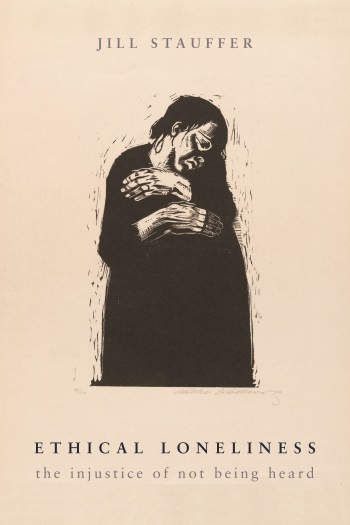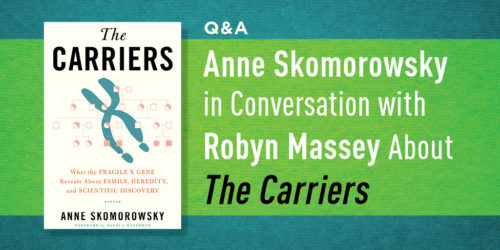Interview with Jill Stauffer, author of Ethical Loneliness

“We live in a world where every relatively privileged life relies on the use of misery: the clothes we wear and the food we eat come from abusive labor conditions, the super-wealthy hide their money in tax havens to avoid contributing to larger social benefit, powerful nations pay corrupt elites in underdeveloped nations for natural resources at rates that benefit everyone except the people living in those underdeveloped nations, and it is all legal.” — Jill Stauffer
The following is an interview with Jill Stauffer, author of Ethical Loneliness: The Injustice of Not Being Heard.
What made you write a book about political repair that focused on loneliness rather than on politics or the work of institutions?
Jill Stauffer: I wrote Ethical Loneliness in response to a gap I felt in discussions people were having in various settings about how to respond to harm. Political reconciliation, transitional justice, political forgiveness and apology, legal adjudication of mass violence, truth commissions, international courts—all these are ways of responding to harm, focused to varying degrees on a discourse of repair. And yet it seemed to me that often, in conversations about these important forms of response, some things were being left unsaid. Forests were being discussed, but trees neglected, I might say. In all these discussions of repair, I kept finding too many moments where institutions designed to hear failed to listen well, and so also failed those they were most meant to serve.
So I set out to try to put a name to this thing that seemed to slip through the cracks of current conversation. I found my way to an answer when I started reading the writings Jean Améry, a holocaust and concentration camp survivor famous for defending the political value of resentment over forgiveness. Reading his work while thinking about Emmanuel Levinas’ early phenomenology—written while held in a forced labor camp during WWII—led me to come up with the term “ethical loneliness,” a name for a double abandonment. Ethical loneliness is the experience of being abandoned by humanity compounded by the experience of not being heard when you testify to what happened.
Can you offer an example of how “ethical loneliness” gets produced?
JS: It might happen when interviewers taking testimony from holocaust survivors want to hear stories of resilience and so cannot hear tales of a self’s destruction; at a truth commission where a political concern with forgiveness means stories of justified resentment go unheard; or in a court of law where the need to establish the facts of a case pushes to the side a larger story of harms caused and worlds destroyed. It might also arise when testimony about a complex story of disrespect and abuse is reduced to a standard rape story due to selective listening or political goals; or when academic discourse analysis takes testimony aiming to demonstrate strength and loss and transforms it into a story only about pain; when the legalized goal of isolating victims from perpetrators fails to see how porous the lines between the two can be in protracted complex conflict; or when those empowered to judge do not adequately understand the context in which histories and stories are conveyed, or the forms they might take, for indigenous or other minority communities. These are all sites where even people who very much want to hear well, do justice and create a better future may fail to do any of that. And that will leave many people feeling unheard, invisible, lonely or worse.
What causes ethical loneliness?
JS: Well, it’s a failure of hearing, but you’re asking why people fail. Reasons for it are just as varied as the occasions where it occurs. Those who fail to hear well may be focused on the facts of the case or the established laws and procedures. They may have a political interest in a restorative discourse. They may be overwhelmed by how far the demand for help exceeds their capacity to offer assistance. Or they may be protecting themselves from the trauma of hearing.
But I think it goes beyond that as well. As I wrote the book, I asked myself how it could be that “bad hearing” was so widespread. And I came to the thought that at least part of the problem resides in the stories we (those of us who care about justice and believe it ought to be fairly equally distributed) tell ourselves about what we owe and how we come to owe it. We want to believe in liberal political theory’s tale of autonomy not only because, for many of us, we find it all around us as we get formed as people—it is a prevalent story. But we also want to believe in a simplified autonomy because it can be too frightening to admit that, just as we were made into who we are by lots of forces beyond our control, including our fellow human beings, we can be destroyed by other human beings. Meaningful autonomy only exists where there are others who will respect its boundaries. And much of what keeps some safe while others get harmed is moral luck, nothing earned or deserved. It can be terrifying to think it, but I see no way out of that truth.
And so we tell ourselves that we are only responsible for what we’ve done and intended, and perhaps we also believe that people get what’s coming to them. But we forget to reason our way to the conclusion that comes from that starting point: that our aspirations toward a better justice will remain unrealized if that’s the story we tell ourselves about responsibility.
How does that follow?
JS: Well, let’s admit up front that sometimes it does work to say that a person is responsible for something she has done, and that the balance disturbed by that bad act can be set aright by some kind of punishment or paying of compensation. That probably works for some kinds of harms. But that story of legal culpability does not correspond to most of the forms of harm discussed in the book: where what causes harm and destroys worlds is not (or not only) individual people who set out to do harm, but also whole ideologies rallied around supporting that harm, supported actively or passively by large populations—nearby or distant, sometimes even the whole world—standing by and doing nothing to resist them. We might like to call these “innocent” wielders of harm bystanders and beneficiaries, but I’m not sure those terms are rich enough to communicate a sense of what actually builds or destroys a world.
But how does believing I’m only responsible for what I’ve set out to do mean that there won’t be better justice?
JS: We live in a world where every relatively privileged life relies on the use of misery: the clothes we wear and the food we eat come from abusive labor conditions, the super-wealthy hide their money in tax havens to avoid contributing to larger social benefit, powerful nations pay corrupt elites in underdeveloped nations for natural resources at rates that benefit everyone except the people living in those underdeveloped nations, and it is all legal. Most individuals benefiting from that misery have not participated directly in imposing oppressive or violent conditions. And so they may think they cannot be responsible for what happens. My point: many will be left unprotected and without recourse even in a world where everyone lives up to their legitimate legal duties and does nothing more than that. More is needed. But in order to see that you have to tell yourself a different story about where responsibility comes from and who bears it. If you believe in a justice beyond bare legal culpability, then you have to accept responsibility for more than what you’ve done and intended.
And how do you tell that story in the book?
JS: To get at where a sense of responsibility beyond bare culpability could come from, I had to work through a phenomenology of how selves get built not as autonomous units but in a dependence on others. I show how that is true not only in dire situations where human vulnerability is exploited, but in daily life, where one’s own possibilities and daily actions are made easier or more difficult by a variety of human-made contexts. Only that story makes sense of how human beings can be destroyed by other human beings, with or without violence (that is, destruction is not only physical but can also be emotional or social). And it begins to dismantle the attachment many of us might have to current ideas self, autonomy and responsibility that only tell half of the story. I don’t discard autonomy (it is a valuable possession!), but rather put it back in relationship with the vulnerability that also defines us as human beings. That vulnerability is not all bad! It brings us love and various kinds of pleasure along with the danger of harm and loss.
OK. So if I care about justice in way that transcends legal institutions, I have to give up my attachment to my limited-version story of responsibility. Is that all?
JS: That’s a step. The book doesn’t just gut you of your autonomy and leave you there. It also gestures at ways out of this deeply rooted impasse. I suggest renewed attention to the human capacity for revision, and a revision of our limited ideas about desert. For anyone living in the wake of an unjust past that should have been otherwise, revision can be a life-saving talent. But it is rarely accomplished by one person acting alone.
What do you mean by revision?
JS: It doesn’t mean denying that the past happened (it isn’t “revisionist”). But it reckons with the different kinds of stories each of us can tell ourselves about the past, over time. We all know that the meaning of past events changes for us over time as we age and/or as our lived context changes. That’s revision. I argue in the book that this, also, is the source of a broad social responsibility. For someone living in a community where what happened to her is widely acknowledged as a wrong that should not have been permitted and will not be allowed in the future, it will be easier for her to narrate the past as over rather than continuing into the present moment than it will be for someone whose losses aren’t acknowledged or who is still surrounded by people who do not treat her with respect or care. In that case the past will not be past. In the wake of massive violence or longstanding oppression, it is everyone’s job to contribute to building a world where positive rather than negative revisions are possible.
So the book sets out a phenomenology of ethical loneliness, discusses how current discourses about truth commissions, international tribunals, political reconciliation and transitional justice contribute to furthering justice but leave important goals unthought, collects together testimony from diverse institutions and a wide range of persons whose worlds have been further destroyed when their words were not properly heard, thinks carefully about the human capacity for revision—for remaking the world—and asks what desert could mean in the wake of all that.



4 Responses